Effectiveness of Directors' Defences in Australian Company Law Context
VerifiedAdded on 2023/03/30
|9
|2300
|489
Essay
AI Summary
This essay examines the effectiveness of the current directors’ defenses regime in Australia, focusing on whether it adequately protects directors in their decision-making and fosters entrepreneurial spirit. It analyzes the roles and responsibilities of directors and management, highlighting the challenges directors face due to unrealistic expectations and the benefit of hindsight in legal proceedings. The essay explores the limitations of existing defenses and argues for the inclusion of an 'honest and reasonable director' defense in the Corporations Act to encourage more confident and proactive decision-making. The discussion includes the importance of clear corporate governance, the impact of hindsight bias, and the need for a balance between accountability and the encouragement of responsible corporate performance. The essay also considers the application of the proposed defense in relation to various breaches under the Corporations Act and the ASIC Act.
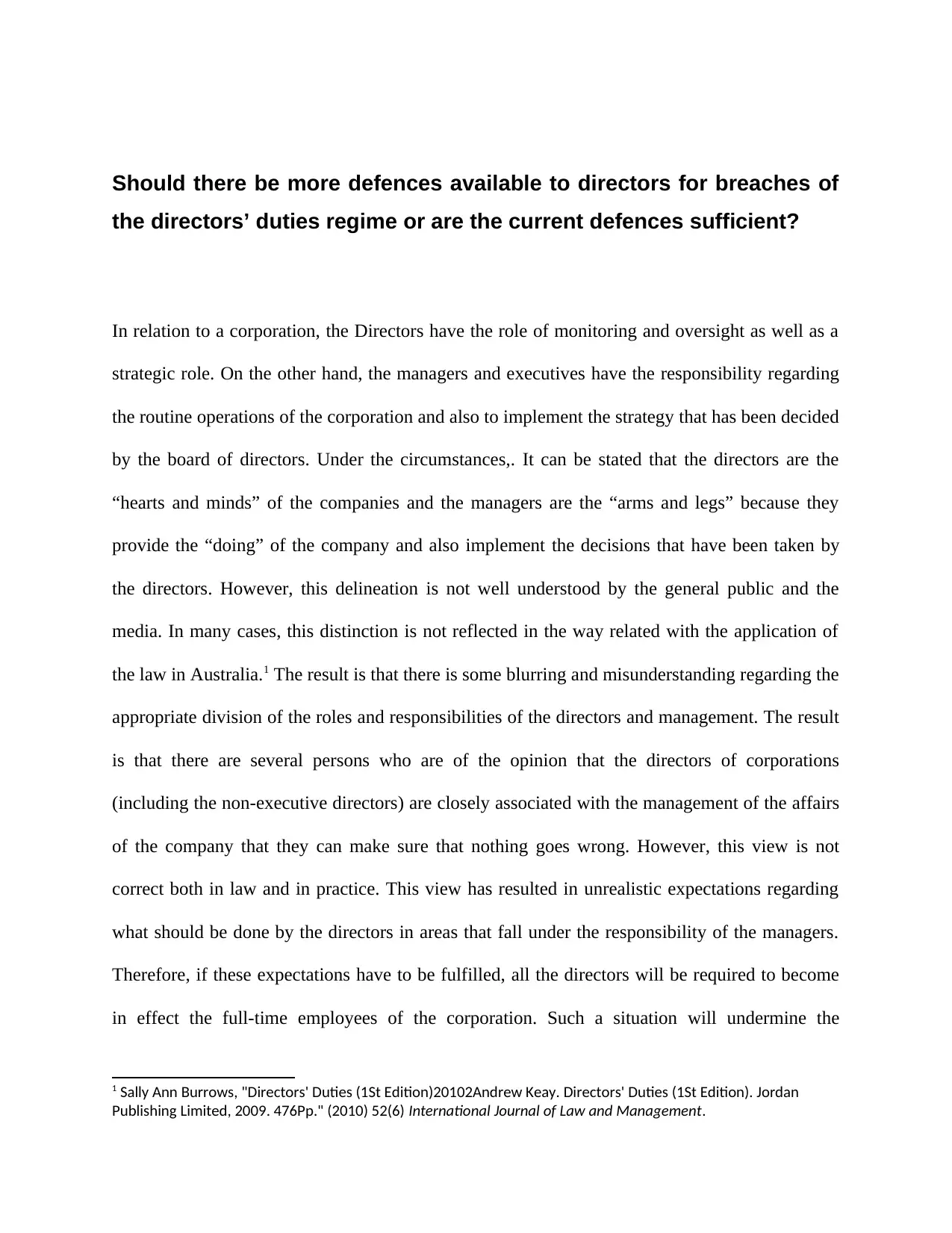
Should there be more defences available to directors for breaches of
the directors’ duties regime or are the current defences sufficient?
In relation to a corporation, the Directors have the role of monitoring and oversight as well as a
strategic role. On the other hand, the managers and executives have the responsibility regarding
the routine operations of the corporation and also to implement the strategy that has been decided
by the board of directors. Under the circumstances,. It can be stated that the directors are the
“hearts and minds” of the companies and the managers are the “arms and legs” because they
provide the “doing” of the company and also implement the decisions that have been taken by
the directors. However, this delineation is not well understood by the general public and the
media. In many cases, this distinction is not reflected in the way related with the application of
the law in Australia.1 The result is that there is some blurring and misunderstanding regarding the
appropriate division of the roles and responsibilities of the directors and management. The result
is that there are several persons who are of the opinion that the directors of corporations
(including the non-executive directors) are closely associated with the management of the affairs
of the company that they can make sure that nothing goes wrong. However, this view is not
correct both in law and in practice. This view has resulted in unrealistic expectations regarding
what should be done by the directors in areas that fall under the responsibility of the managers.
Therefore, if these expectations have to be fulfilled, all the directors will be required to become
in effect the full-time employees of the corporation. Such a situation will undermine the
1 Sally Ann Burrows, "Directors' Duties (1St Edition)20102Andrew Keay. Directors' Duties (1St Edition). Jordan
Publishing Limited, 2009. 476Pp." (2010) 52(6) International Journal of Law and Management.
the directors’ duties regime or are the current defences sufficient?
In relation to a corporation, the Directors have the role of monitoring and oversight as well as a
strategic role. On the other hand, the managers and executives have the responsibility regarding
the routine operations of the corporation and also to implement the strategy that has been decided
by the board of directors. Under the circumstances,. It can be stated that the directors are the
“hearts and minds” of the companies and the managers are the “arms and legs” because they
provide the “doing” of the company and also implement the decisions that have been taken by
the directors. However, this delineation is not well understood by the general public and the
media. In many cases, this distinction is not reflected in the way related with the application of
the law in Australia.1 The result is that there is some blurring and misunderstanding regarding the
appropriate division of the roles and responsibilities of the directors and management. The result
is that there are several persons who are of the opinion that the directors of corporations
(including the non-executive directors) are closely associated with the management of the affairs
of the company that they can make sure that nothing goes wrong. However, this view is not
correct both in law and in practice. This view has resulted in unrealistic expectations regarding
what should be done by the directors in areas that fall under the responsibility of the managers.
Therefore, if these expectations have to be fulfilled, all the directors will be required to become
in effect the full-time employees of the corporation. Such a situation will undermine the
1 Sally Ann Burrows, "Directors' Duties (1St Edition)20102Andrew Keay. Directors' Duties (1St Edition). Jordan
Publishing Limited, 2009. 476Pp." (2010) 52(6) International Journal of Law and Management.
Paraphrase This Document
Need a fresh take? Get an instant paraphrase of this document with our AI Paraphraser
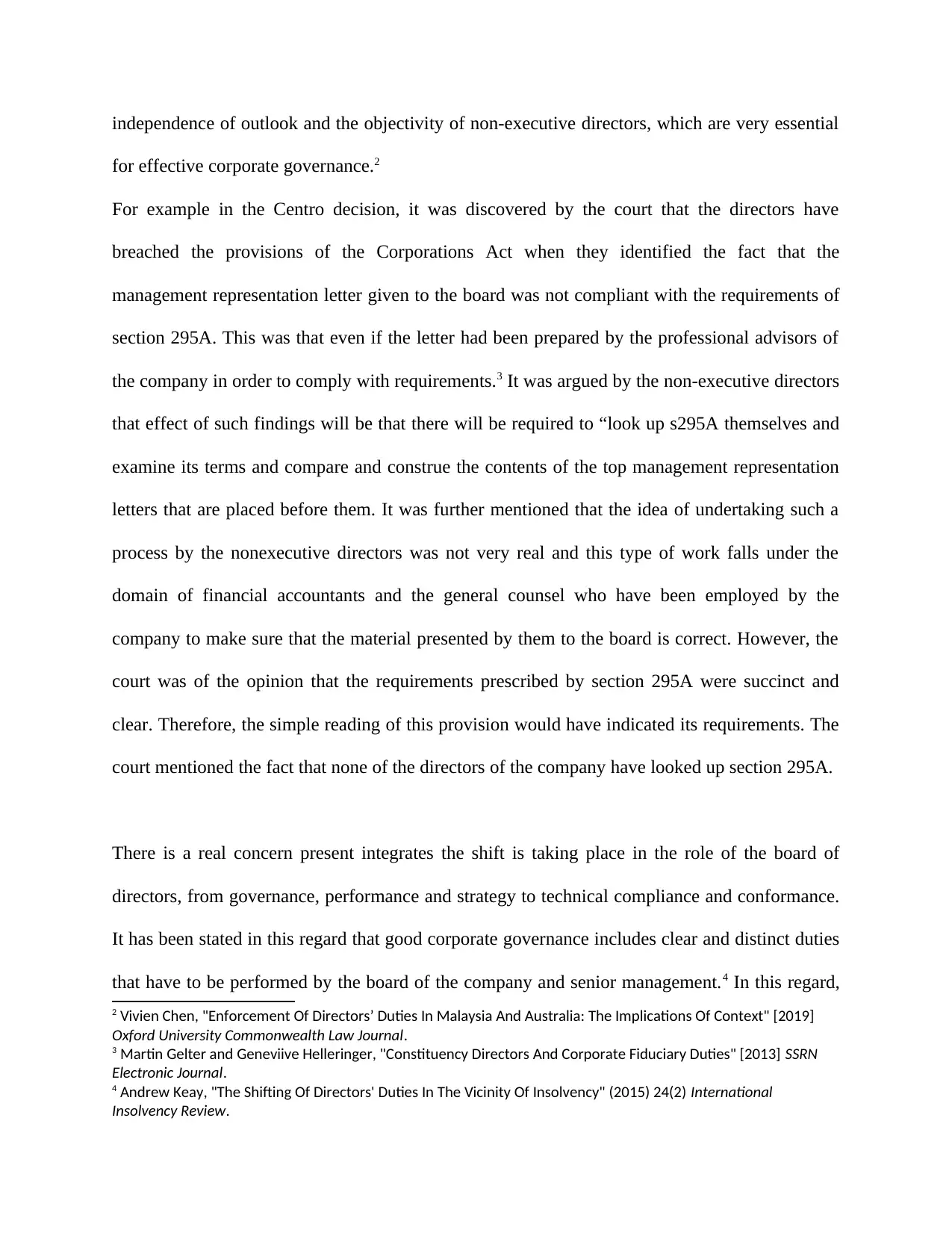
independence of outlook and the objectivity of non-executive directors, which are very essential
for effective corporate governance.2
For example in the Centro decision, it was discovered by the court that the directors have
breached the provisions of the Corporations Act when they identified the fact that the
management representation letter given to the board was not compliant with the requirements of
section 295A. This was that even if the letter had been prepared by the professional advisors of
the company in order to comply with requirements.3 It was argued by the non-executive directors
that effect of such findings will be that there will be required to “look up s295A themselves and
examine its terms and compare and construe the contents of the top management representation
letters that are placed before them. It was further mentioned that the idea of undertaking such a
process by the nonexecutive directors was not very real and this type of work falls under the
domain of financial accountants and the general counsel who have been employed by the
company to make sure that the material presented by them to the board is correct. However, the
court was of the opinion that the requirements prescribed by section 295A were succinct and
clear. Therefore, the simple reading of this provision would have indicated its requirements. The
court mentioned the fact that none of the directors of the company have looked up section 295A.
There is a real concern present integrates the shift is taking place in the role of the board of
directors, from governance, performance and strategy to technical compliance and conformance.
It has been stated in this regard that good corporate governance includes clear and distinct duties
that have to be performed by the board of the company and senior management.4 In this regard,
2 Vivien Chen, "Enforcement Of Directors’ Duties In Malaysia And Australia: The Implications Of Context" [2019]
Oxford University Commonwealth Law Journal.
3 Martin Gelter and Geneviive Helleringer, "Constituency Directors And Corporate Fiduciary Duties" [2013] SSRN
Electronic Journal.
4 Andrew Keay, "The Shifting Of Directors' Duties In The Vicinity Of Insolvency" (2015) 24(2) International
Insolvency Review.
for effective corporate governance.2
For example in the Centro decision, it was discovered by the court that the directors have
breached the provisions of the Corporations Act when they identified the fact that the
management representation letter given to the board was not compliant with the requirements of
section 295A. This was that even if the letter had been prepared by the professional advisors of
the company in order to comply with requirements.3 It was argued by the non-executive directors
that effect of such findings will be that there will be required to “look up s295A themselves and
examine its terms and compare and construe the contents of the top management representation
letters that are placed before them. It was further mentioned that the idea of undertaking such a
process by the nonexecutive directors was not very real and this type of work falls under the
domain of financial accountants and the general counsel who have been employed by the
company to make sure that the material presented by them to the board is correct. However, the
court was of the opinion that the requirements prescribed by section 295A were succinct and
clear. Therefore, the simple reading of this provision would have indicated its requirements. The
court mentioned the fact that none of the directors of the company have looked up section 295A.
There is a real concern present integrates the shift is taking place in the role of the board of
directors, from governance, performance and strategy to technical compliance and conformance.
It has been stated in this regard that good corporate governance includes clear and distinct duties
that have to be performed by the board of the company and senior management.4 In this regard,
2 Vivien Chen, "Enforcement Of Directors’ Duties In Malaysia And Australia: The Implications Of Context" [2019]
Oxford University Commonwealth Law Journal.
3 Martin Gelter and Geneviive Helleringer, "Constituency Directors And Corporate Fiduciary Duties" [2013] SSRN
Electronic Journal.
4 Andrew Keay, "The Shifting Of Directors' Duties In The Vicinity Of Insolvency" (2015) 24(2) International
Insolvency Review.
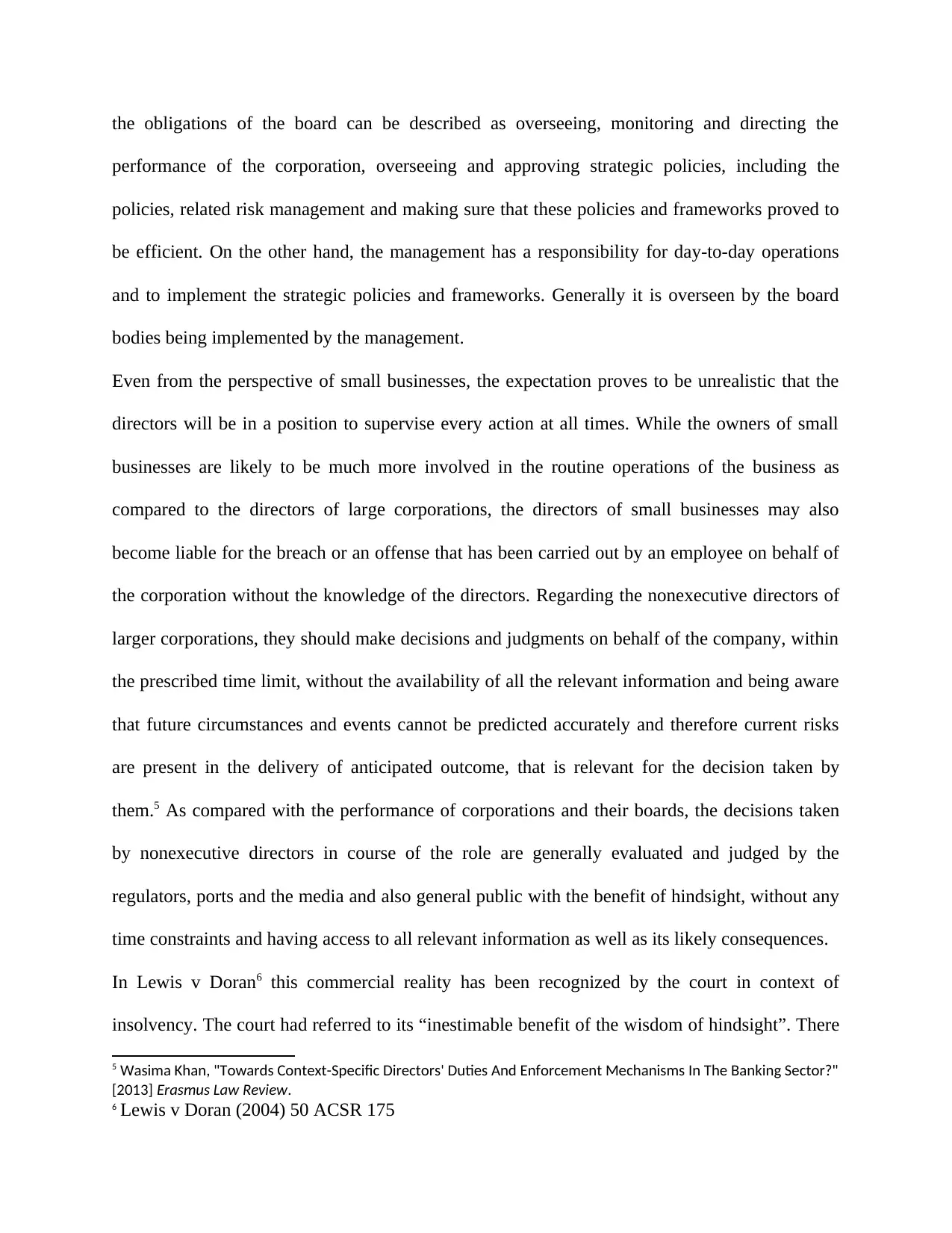
the obligations of the board can be described as overseeing, monitoring and directing the
performance of the corporation, overseeing and approving strategic policies, including the
policies, related risk management and making sure that these policies and frameworks proved to
be efficient. On the other hand, the management has a responsibility for day-to-day operations
and to implement the strategic policies and frameworks. Generally it is overseen by the board
bodies being implemented by the management.
Even from the perspective of small businesses, the expectation proves to be unrealistic that the
directors will be in a position to supervise every action at all times. While the owners of small
businesses are likely to be much more involved in the routine operations of the business as
compared to the directors of large corporations, the directors of small businesses may also
become liable for the breach or an offense that has been carried out by an employee on behalf of
the corporation without the knowledge of the directors. Regarding the nonexecutive directors of
larger corporations, they should make decisions and judgments on behalf of the company, within
the prescribed time limit, without the availability of all the relevant information and being aware
that future circumstances and events cannot be predicted accurately and therefore current risks
are present in the delivery of anticipated outcome, that is relevant for the decision taken by
them.5 As compared with the performance of corporations and their boards, the decisions taken
by nonexecutive directors in course of the role are generally evaluated and judged by the
regulators, ports and the media and also general public with the benefit of hindsight, without any
time constraints and having access to all relevant information as well as its likely consequences.
In Lewis v Doran6 this commercial reality has been recognized by the court in context of
insolvency. The court had referred to its “inestimable benefit of the wisdom of hindsight”. There
5 Wasima Khan, "Towards Context-Specific Directors' Duties And Enforcement Mechanisms In The Banking Sector?"
[2013] Erasmus Law Review.
6 Lewis v Doran (2004) 50 ACSR 175
performance of the corporation, overseeing and approving strategic policies, including the
policies, related risk management and making sure that these policies and frameworks proved to
be efficient. On the other hand, the management has a responsibility for day-to-day operations
and to implement the strategic policies and frameworks. Generally it is overseen by the board
bodies being implemented by the management.
Even from the perspective of small businesses, the expectation proves to be unrealistic that the
directors will be in a position to supervise every action at all times. While the owners of small
businesses are likely to be much more involved in the routine operations of the business as
compared to the directors of large corporations, the directors of small businesses may also
become liable for the breach or an offense that has been carried out by an employee on behalf of
the corporation without the knowledge of the directors. Regarding the nonexecutive directors of
larger corporations, they should make decisions and judgments on behalf of the company, within
the prescribed time limit, without the availability of all the relevant information and being aware
that future circumstances and events cannot be predicted accurately and therefore current risks
are present in the delivery of anticipated outcome, that is relevant for the decision taken by
them.5 As compared with the performance of corporations and their boards, the decisions taken
by nonexecutive directors in course of the role are generally evaluated and judged by the
regulators, ports and the media and also general public with the benefit of hindsight, without any
time constraints and having access to all relevant information as well as its likely consequences.
In Lewis v Doran6 this commercial reality has been recognized by the court in context of
insolvency. The court had referred to its “inestimable benefit of the wisdom of hindsight”. There
5 Wasima Khan, "Towards Context-Specific Directors' Duties And Enforcement Mechanisms In The Banking Sector?"
[2013] Erasmus Law Review.
6 Lewis v Doran (2004) 50 ACSR 175
⊘ This is a preview!⊘
Do you want full access?
Subscribe today to unlock all pages.

Trusted by 1+ million students worldwide
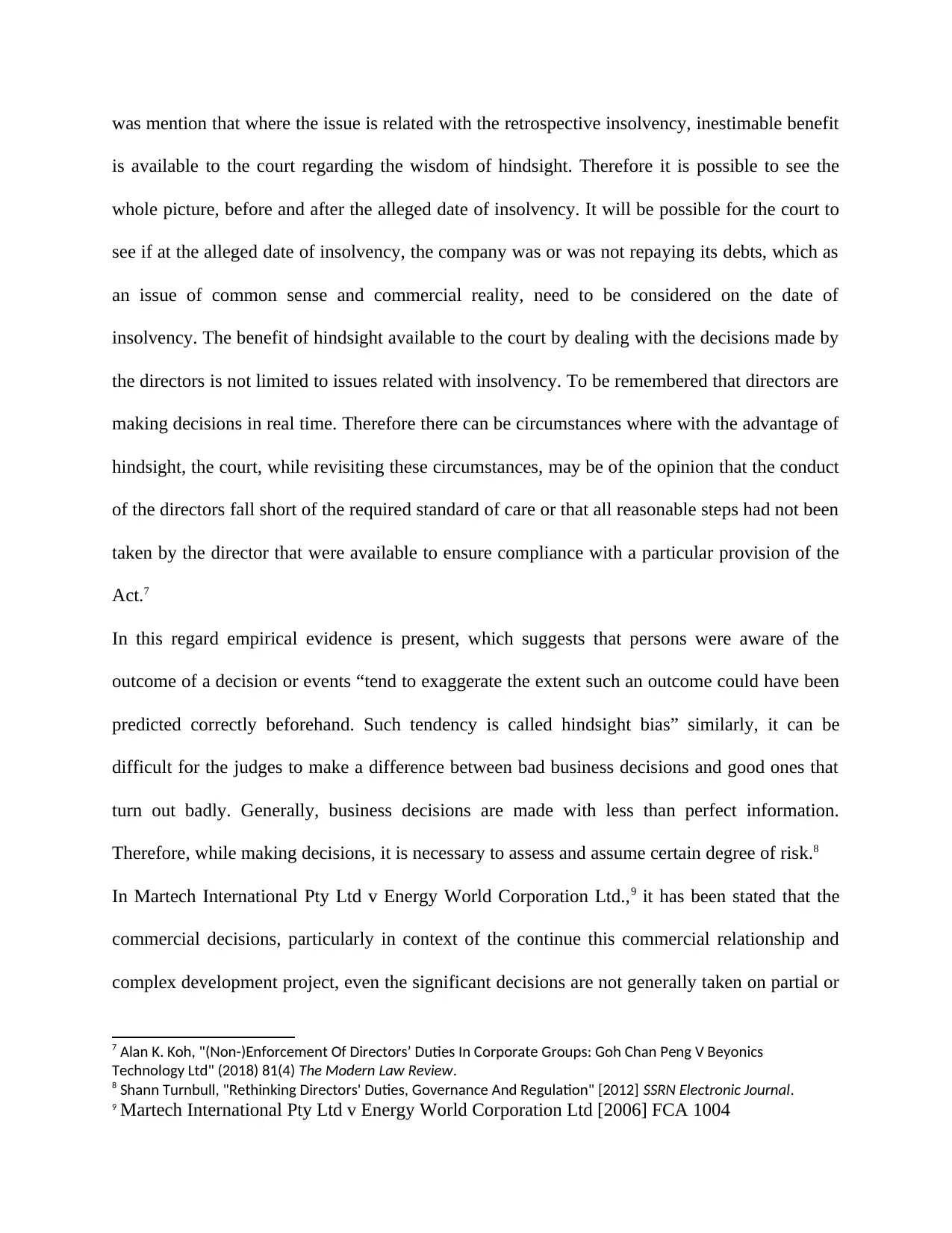
was mention that where the issue is related with the retrospective insolvency, inestimable benefit
is available to the court regarding the wisdom of hindsight. Therefore it is possible to see the
whole picture, before and after the alleged date of insolvency. It will be possible for the court to
see if at the alleged date of insolvency, the company was or was not repaying its debts, which as
an issue of common sense and commercial reality, need to be considered on the date of
insolvency. The benefit of hindsight available to the court by dealing with the decisions made by
the directors is not limited to issues related with insolvency. To be remembered that directors are
making decisions in real time. Therefore there can be circumstances where with the advantage of
hindsight, the court, while revisiting these circumstances, may be of the opinion that the conduct
of the directors fall short of the required standard of care or that all reasonable steps had not been
taken by the director that were available to ensure compliance with a particular provision of the
Act.7
In this regard empirical evidence is present, which suggests that persons were aware of the
outcome of a decision or events “tend to exaggerate the extent such an outcome could have been
predicted correctly beforehand. Such tendency is called hindsight bias” similarly, it can be
difficult for the judges to make a difference between bad business decisions and good ones that
turn out badly. Generally, business decisions are made with less than perfect information.
Therefore, while making decisions, it is necessary to assess and assume certain degree of risk.8
In Martech International Pty Ltd v Energy World Corporation Ltd.,9 it has been stated that the
commercial decisions, particularly in context of the continue this commercial relationship and
complex development project, even the significant decisions are not generally taken on partial or
7 Alan K. Koh, "(Non-)Enforcement Of Directors’ Duties In Corporate Groups: Goh Chan Peng V Beyonics
Technology Ltd" (2018) 81(4) The Modern Law Review.
8 Shann Turnbull, "Rethinking Directors' Duties, Governance And Regulation" [2012] SSRN Electronic Journal.
9 Martech International Pty Ltd v Energy World Corporation Ltd [2006] FCA 1004
is available to the court regarding the wisdom of hindsight. Therefore it is possible to see the
whole picture, before and after the alleged date of insolvency. It will be possible for the court to
see if at the alleged date of insolvency, the company was or was not repaying its debts, which as
an issue of common sense and commercial reality, need to be considered on the date of
insolvency. The benefit of hindsight available to the court by dealing with the decisions made by
the directors is not limited to issues related with insolvency. To be remembered that directors are
making decisions in real time. Therefore there can be circumstances where with the advantage of
hindsight, the court, while revisiting these circumstances, may be of the opinion that the conduct
of the directors fall short of the required standard of care or that all reasonable steps had not been
taken by the director that were available to ensure compliance with a particular provision of the
Act.7
In this regard empirical evidence is present, which suggests that persons were aware of the
outcome of a decision or events “tend to exaggerate the extent such an outcome could have been
predicted correctly beforehand. Such tendency is called hindsight bias” similarly, it can be
difficult for the judges to make a difference between bad business decisions and good ones that
turn out badly. Generally, business decisions are made with less than perfect information.
Therefore, while making decisions, it is necessary to assess and assume certain degree of risk.8
In Martech International Pty Ltd v Energy World Corporation Ltd.,9 it has been stated that the
commercial decisions, particularly in context of the continue this commercial relationship and
complex development project, even the significant decisions are not generally taken on partial or
7 Alan K. Koh, "(Non-)Enforcement Of Directors’ Duties In Corporate Groups: Goh Chan Peng V Beyonics
Technology Ltd" (2018) 81(4) The Modern Law Review.
8 Shann Turnbull, "Rethinking Directors' Duties, Governance And Regulation" [2012] SSRN Electronic Journal.
9 Martech International Pty Ltd v Energy World Corporation Ltd [2006] FCA 1004
Paraphrase This Document
Need a fresh take? Get an instant paraphrase of this document with our AI Paraphraser
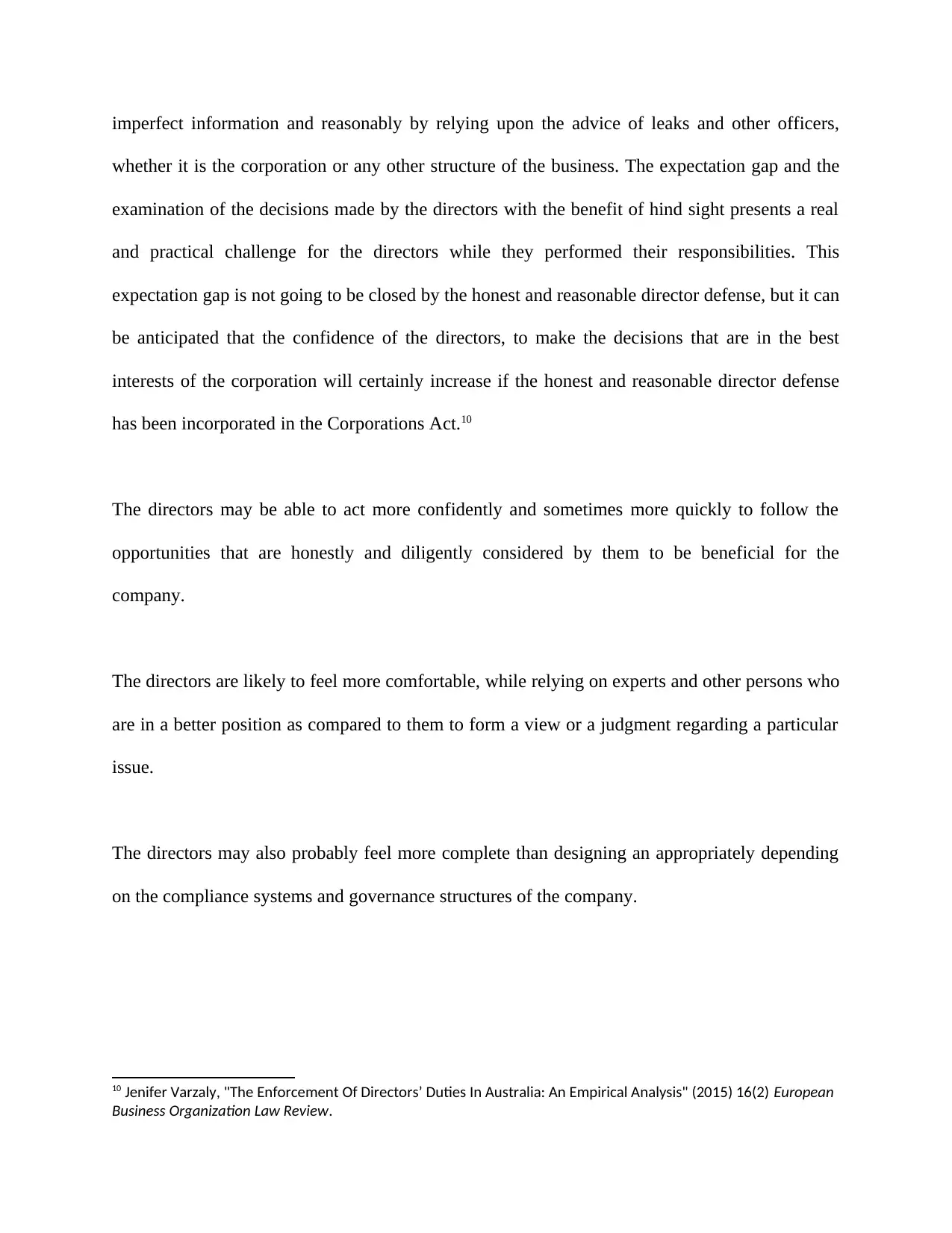
imperfect information and reasonably by relying upon the advice of leaks and other officers,
whether it is the corporation or any other structure of the business. The expectation gap and the
examination of the decisions made by the directors with the benefit of hind sight presents a real
and practical challenge for the directors while they performed their responsibilities. This
expectation gap is not going to be closed by the honest and reasonable director defense, but it can
be anticipated that the confidence of the directors, to make the decisions that are in the best
interests of the corporation will certainly increase if the honest and reasonable director defense
has been incorporated in the Corporations Act.10
The directors may be able to act more confidently and sometimes more quickly to follow the
opportunities that are honestly and diligently considered by them to be beneficial for the
company.
The directors are likely to feel more comfortable, while relying on experts and other persons who
are in a better position as compared to them to form a view or a judgment regarding a particular
issue.
The directors may also probably feel more complete than designing an appropriately depending
on the compliance systems and governance structures of the company.
10 Jenifer Varzaly, "The Enforcement Of Directors’ Duties In Australia: An Empirical Analysis" (2015) 16(2) European
Business Organization Law Review.
whether it is the corporation or any other structure of the business. The expectation gap and the
examination of the decisions made by the directors with the benefit of hind sight presents a real
and practical challenge for the directors while they performed their responsibilities. This
expectation gap is not going to be closed by the honest and reasonable director defense, but it can
be anticipated that the confidence of the directors, to make the decisions that are in the best
interests of the corporation will certainly increase if the honest and reasonable director defense
has been incorporated in the Corporations Act.10
The directors may be able to act more confidently and sometimes more quickly to follow the
opportunities that are honestly and diligently considered by them to be beneficial for the
company.
The directors are likely to feel more comfortable, while relying on experts and other persons who
are in a better position as compared to them to form a view or a judgment regarding a particular
issue.
The directors may also probably feel more complete than designing an appropriately depending
on the compliance systems and governance structures of the company.
10 Jenifer Varzaly, "The Enforcement Of Directors’ Duties In Australia: An Empirical Analysis" (2015) 16(2) European
Business Organization Law Review.
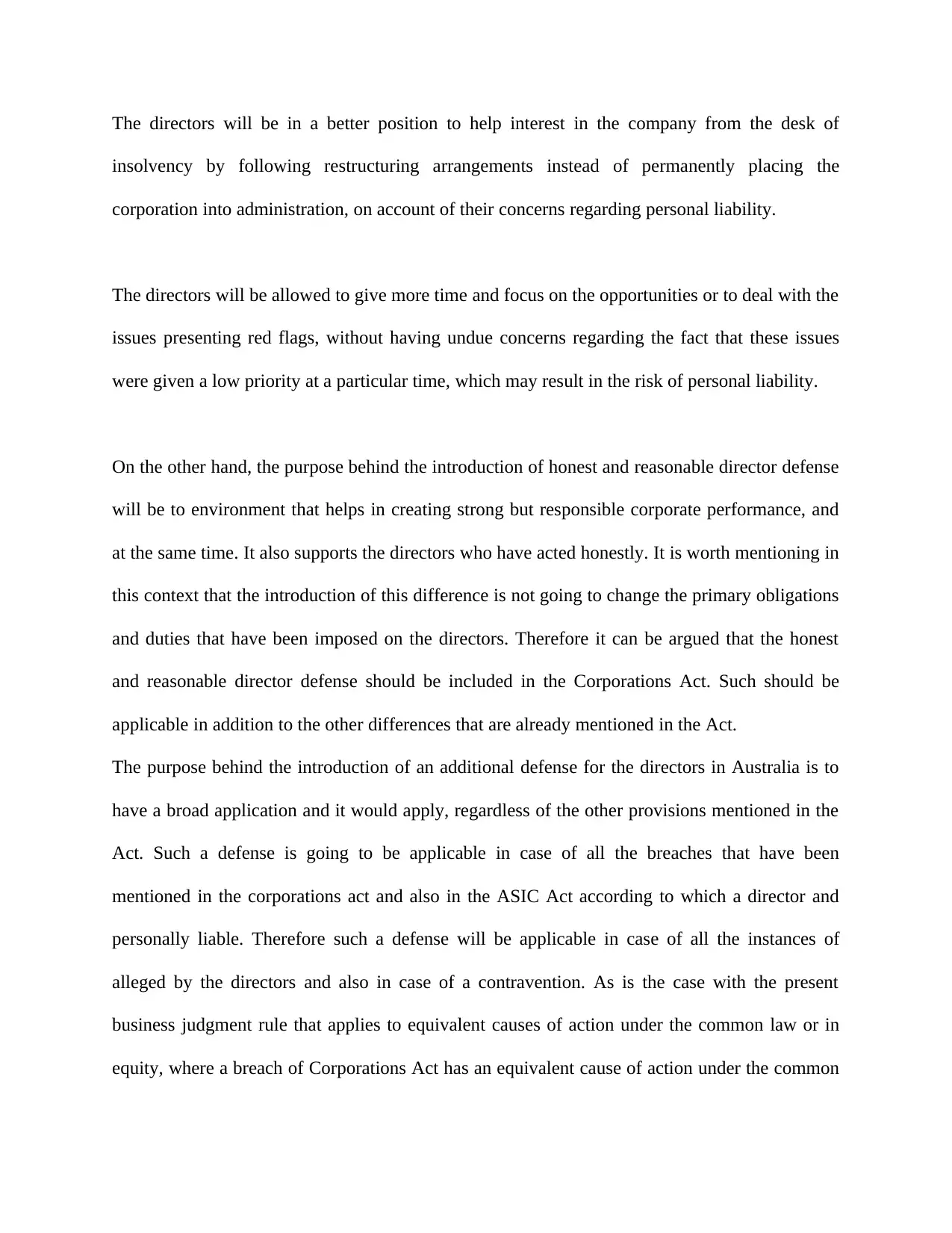
The directors will be in a better position to help interest in the company from the desk of
insolvency by following restructuring arrangements instead of permanently placing the
corporation into administration, on account of their concerns regarding personal liability.
The directors will be allowed to give more time and focus on the opportunities or to deal with the
issues presenting red flags, without having undue concerns regarding the fact that these issues
were given a low priority at a particular time, which may result in the risk of personal liability.
On the other hand, the purpose behind the introduction of honest and reasonable director defense
will be to environment that helps in creating strong but responsible corporate performance, and
at the same time. It also supports the directors who have acted honestly. It is worth mentioning in
this context that the introduction of this difference is not going to change the primary obligations
and duties that have been imposed on the directors. Therefore it can be argued that the honest
and reasonable director defense should be included in the Corporations Act. Such should be
applicable in addition to the other differences that are already mentioned in the Act.
The purpose behind the introduction of an additional defense for the directors in Australia is to
have a broad application and it would apply, regardless of the other provisions mentioned in the
Act. Such a defense is going to be applicable in case of all the breaches that have been
mentioned in the corporations act and also in the ASIC Act according to which a director and
personally liable. Therefore such a defense will be applicable in case of all the instances of
alleged by the directors and also in case of a contravention. As is the case with the present
business judgment rule that applies to equivalent causes of action under the common law or in
equity, where a breach of Corporations Act has an equivalent cause of action under the common
insolvency by following restructuring arrangements instead of permanently placing the
corporation into administration, on account of their concerns regarding personal liability.
The directors will be allowed to give more time and focus on the opportunities or to deal with the
issues presenting red flags, without having undue concerns regarding the fact that these issues
were given a low priority at a particular time, which may result in the risk of personal liability.
On the other hand, the purpose behind the introduction of honest and reasonable director defense
will be to environment that helps in creating strong but responsible corporate performance, and
at the same time. It also supports the directors who have acted honestly. It is worth mentioning in
this context that the introduction of this difference is not going to change the primary obligations
and duties that have been imposed on the directors. Therefore it can be argued that the honest
and reasonable director defense should be included in the Corporations Act. Such should be
applicable in addition to the other differences that are already mentioned in the Act.
The purpose behind the introduction of an additional defense for the directors in Australia is to
have a broad application and it would apply, regardless of the other provisions mentioned in the
Act. Such a defense is going to be applicable in case of all the breaches that have been
mentioned in the corporations act and also in the ASIC Act according to which a director and
personally liable. Therefore such a defense will be applicable in case of all the instances of
alleged by the directors and also in case of a contravention. As is the case with the present
business judgment rule that applies to equivalent causes of action under the common law or in
equity, where a breach of Corporations Act has an equivalent cause of action under the common
⊘ This is a preview!⊘
Do you want full access?
Subscribe today to unlock all pages.

Trusted by 1+ million students worldwide
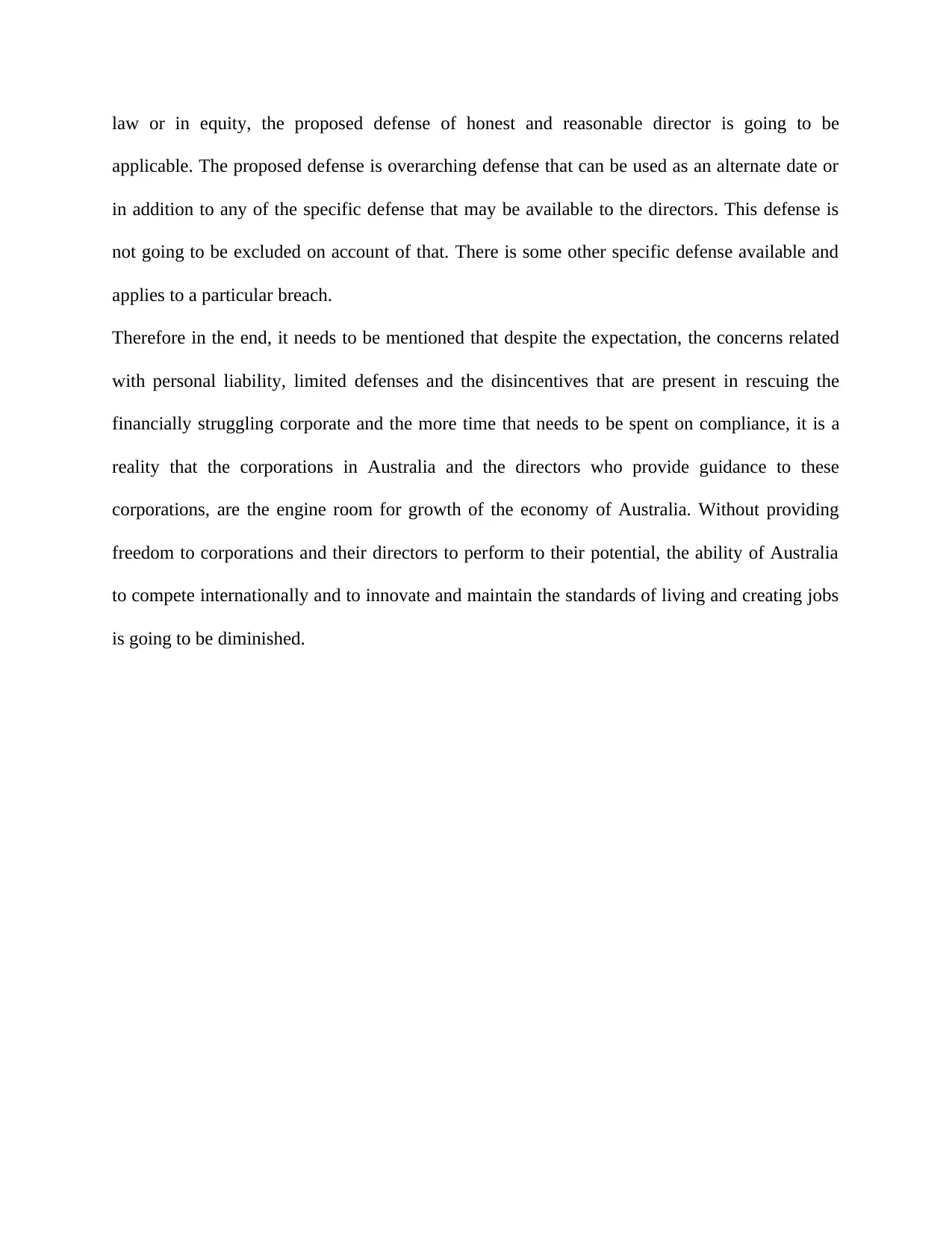
law or in equity, the proposed defense of honest and reasonable director is going to be
applicable. The proposed defense is overarching defense that can be used as an alternate date or
in addition to any of the specific defense that may be available to the directors. This defense is
not going to be excluded on account of that. There is some other specific defense available and
applies to a particular breach.
Therefore in the end, it needs to be mentioned that despite the expectation, the concerns related
with personal liability, limited defenses and the disincentives that are present in rescuing the
financially struggling corporate and the more time that needs to be spent on compliance, it is a
reality that the corporations in Australia and the directors who provide guidance to these
corporations, are the engine room for growth of the economy of Australia. Without providing
freedom to corporations and their directors to perform to their potential, the ability of Australia
to compete internationally and to innovate and maintain the standards of living and creating jobs
is going to be diminished.
applicable. The proposed defense is overarching defense that can be used as an alternate date or
in addition to any of the specific defense that may be available to the directors. This defense is
not going to be excluded on account of that. There is some other specific defense available and
applies to a particular breach.
Therefore in the end, it needs to be mentioned that despite the expectation, the concerns related
with personal liability, limited defenses and the disincentives that are present in rescuing the
financially struggling corporate and the more time that needs to be spent on compliance, it is a
reality that the corporations in Australia and the directors who provide guidance to these
corporations, are the engine room for growth of the economy of Australia. Without providing
freedom to corporations and their directors to perform to their potential, the ability of Australia
to compete internationally and to innovate and maintain the standards of living and creating jobs
is going to be diminished.
Paraphrase This Document
Need a fresh take? Get an instant paraphrase of this document with our AI Paraphraser
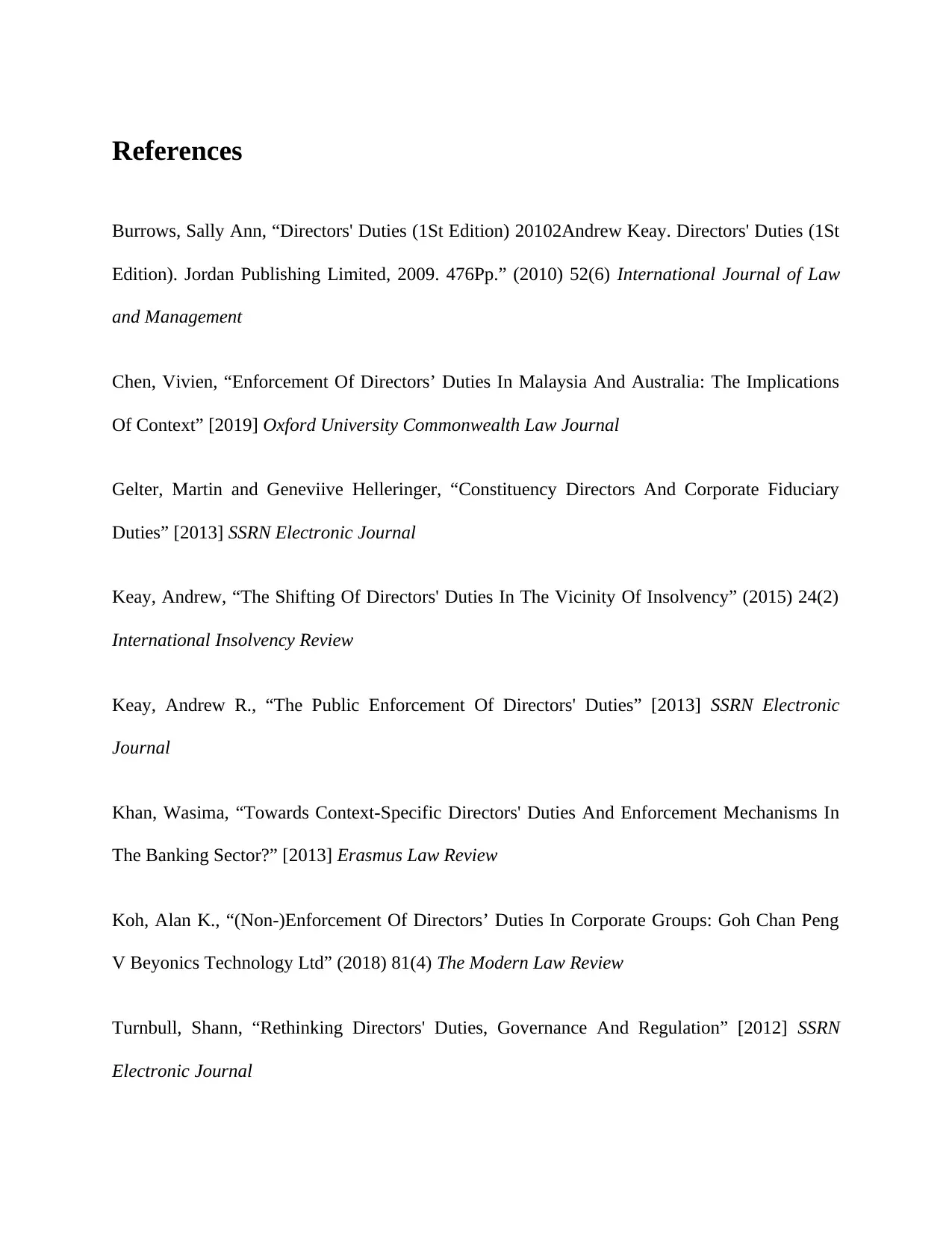
References
Burrows, Sally Ann, “Directors' Duties (1St Edition) 20102Andrew Keay. Directors' Duties (1St
Edition). Jordan Publishing Limited, 2009. 476Pp.” (2010) 52(6) International Journal of Law
and Management
Chen, Vivien, “Enforcement Of Directors’ Duties In Malaysia And Australia: The Implications
Of Context” [2019] Oxford University Commonwealth Law Journal
Gelter, Martin and Geneviive Helleringer, “Constituency Directors And Corporate Fiduciary
Duties” [2013] SSRN Electronic Journal
Keay, Andrew, “The Shifting Of Directors' Duties In The Vicinity Of Insolvency” (2015) 24(2)
International Insolvency Review
Keay, Andrew R., “The Public Enforcement Of Directors' Duties” [2013] SSRN Electronic
Journal
Khan, Wasima, “Towards Context-Specific Directors' Duties And Enforcement Mechanisms In
The Banking Sector?” [2013] Erasmus Law Review
Koh, Alan K., “(Non-)Enforcement Of Directors’ Duties In Corporate Groups: Goh Chan Peng
V Beyonics Technology Ltd” (2018) 81(4) The Modern Law Review
Turnbull, Shann, “Rethinking Directors' Duties, Governance And Regulation” [2012] SSRN
Electronic Journal
Burrows, Sally Ann, “Directors' Duties (1St Edition) 20102Andrew Keay. Directors' Duties (1St
Edition). Jordan Publishing Limited, 2009. 476Pp.” (2010) 52(6) International Journal of Law
and Management
Chen, Vivien, “Enforcement Of Directors’ Duties In Malaysia And Australia: The Implications
Of Context” [2019] Oxford University Commonwealth Law Journal
Gelter, Martin and Geneviive Helleringer, “Constituency Directors And Corporate Fiduciary
Duties” [2013] SSRN Electronic Journal
Keay, Andrew, “The Shifting Of Directors' Duties In The Vicinity Of Insolvency” (2015) 24(2)
International Insolvency Review
Keay, Andrew R., “The Public Enforcement Of Directors' Duties” [2013] SSRN Electronic
Journal
Khan, Wasima, “Towards Context-Specific Directors' Duties And Enforcement Mechanisms In
The Banking Sector?” [2013] Erasmus Law Review
Koh, Alan K., “(Non-)Enforcement Of Directors’ Duties In Corporate Groups: Goh Chan Peng
V Beyonics Technology Ltd” (2018) 81(4) The Modern Law Review
Turnbull, Shann, “Rethinking Directors' Duties, Governance And Regulation” [2012] SSRN
Electronic Journal
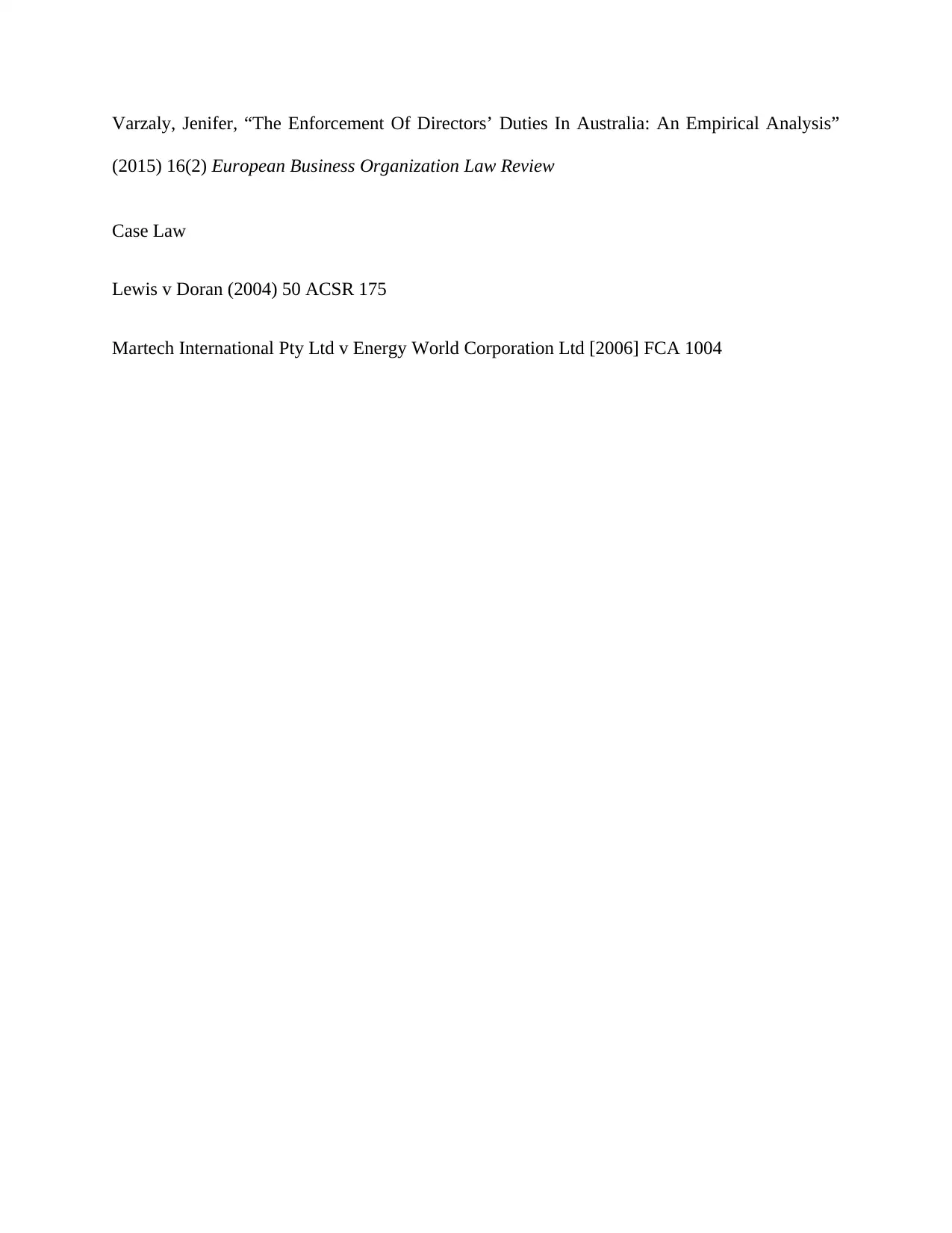
Varzaly, Jenifer, “The Enforcement Of Directors’ Duties In Australia: An Empirical Analysis”
(2015) 16(2) European Business Organization Law Review
Case Law
Lewis v Doran (2004) 50 ACSR 175
Martech International Pty Ltd v Energy World Corporation Ltd [2006] FCA 1004
(2015) 16(2) European Business Organization Law Review
Case Law
Lewis v Doran (2004) 50 ACSR 175
Martech International Pty Ltd v Energy World Corporation Ltd [2006] FCA 1004
⊘ This is a preview!⊘
Do you want full access?
Subscribe today to unlock all pages.

Trusted by 1+ million students worldwide
1 out of 9
Related Documents
Your All-in-One AI-Powered Toolkit for Academic Success.
+13062052269
info@desklib.com
Available 24*7 on WhatsApp / Email
![[object Object]](/_next/static/media/star-bottom.7253800d.svg)
Unlock your academic potential
Copyright © 2020–2026 A2Z Services. All Rights Reserved. Developed and managed by ZUCOL.




